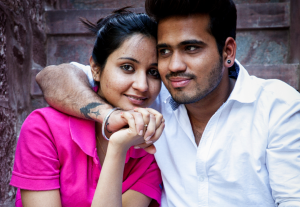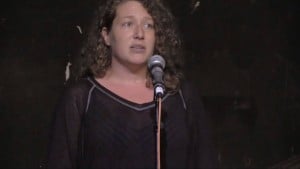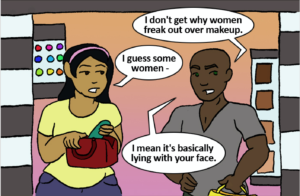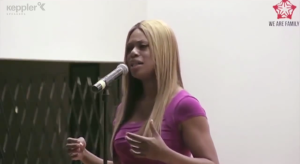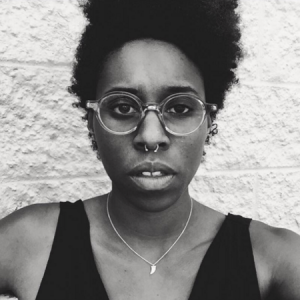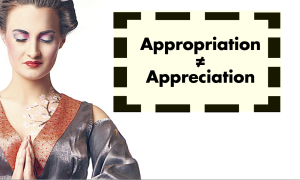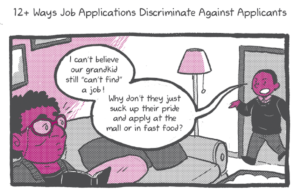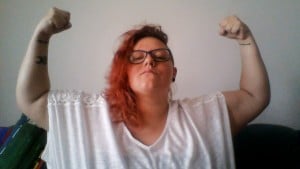
A closeup on a group of hands stacked on each other. One of the people pictured is seated, while the rest stand.
Originally published on The Body is Not an Apology and republished here with their permission.
When conscious, caring people learn about injustices in the world, one of their most commonly asked questions is, “What can I do?”
I know the feeling well: the despair and helplessness that come with the yearning to fix an inequity, along with the awareness of a lack of means. The if-onlys chip away at my heart. If only I were a real activist. If only I had a platform. If only I had a million, a billion, a gazillion dollars to invest in this issue. If only, if only, if only.
But we don’t need endless resources to be compassionate human beings. We already have the resources to participate in everyday radical activism and invest in radical love.
Remember that radical love is both a process and an outcome.
Remember the Latin root of “radical” – the root. The source of radical activism is below the foundation. The real problems lie at the root, so to solve them, we need to start there. Clipping the leaves is not enough. Charity or pontification throw solutions from the top down.
So even if you feel that you don’t have the power to make a “real” difference in social justice movements, remember to go back to the root. To truly change the system, we must draw upon core resources: our voices, our relationships, and our resolve.
Here are some things anyone, anywhere can do. Obviously, this list is not comprehensive, but it’s a good start!
1. Listen and learn.
No matter how knowledgeable or passionate you are, there’s always more to discover and more nuances to understand.
2. Know when to speak up and when to stay silent.
Let other people know about your experiences, but also keep in mind what your privileges are.
Don’t be a “voice for the voiceless,” because having a marginalized voice does not mean someone is voiceless.
3. When you do stay silent, signal boost the voices of others.
Remember the first item on this list!
Silence doesn’t always mean tuning out. It can mean listening carefully, too. If you care about an issue that you hold privilege in, bolster the voices of oppressed people speaking on that issue.
Publish, re-blog, or share other people’s words.
As a young, fairly inexperienced writer who is just starting out, I don’t have much of a platform, but I do have control over my personal online spaces. Because I am cisgender and able-bodied, I retweet people speaking from personal experience on the respective issues of ableism and anti-transgender aggression, rather than composing my own tweets on those issues.
4. Review your language.
Whatever your language and means of communication, you can think more carefully about the words you use.
Take out all of the ableist terms in your vocabulary. Be careful of binary language that can be offensive. Learn and use people’s pronouns.
(By the way, I usually prefer “she/her,” but because my first language uses non-gendered pronouns, it also feels right to be addressed as “they/their.”)
5. Call out people in your own community.
Keep your friends and family liable for harmful things they say. However uncomfortable you feel about your relatives who are racist, sexist, homophobic, transphobic, ableist, and so on, there are people in the world who are hurt even more by their words.
On a family trip to Thailand, my mom and grandma made some transphobic comments about the trans women dancers in a show. They kept remarking that they “couldn’t believe they were really men, because they were more beautiful than real women.”
Even though they thought they were complimenting the women, they were actually being offensive and harmful.
So although I felt like I was souring our vacation, I called them in anyways. I told them that those comments weren’t acceptable because trans women are real women.
Trust me, I understand the amount of effort it takes to call in people in your life, but if you truly care about them, you’ll want them to learn and do better too. After all, the revolution begins at home.
6. Learn context and history.
Don’t be ahistorical and don’t twist history to fit a narrative that isn’t yours. At the apex of the Ferguson protests, many people expressed thoughts such as, “I agree with the message, but not the method. Martin Luther King Jr. would be disappointed with these violent protests.”
This is a blatant disregard for the history of the Civil Rights Movement. Nonviolent does not mean peaceful. Disruption and commotion are not acts of violence – they are expressions of the right to protest our system.
Furthermore, it is not the place of us non-black people to use a black leader’s name to silence black people, especially when you ignore the fact that King was literally gunned down by the white supremacist system he was peacefully protesting.
Another example is the past furor around the Seth Rogen and James Franco movie, The Interview. When I expressed disgust at the people rallying around the racist movie, I was told that I was “against free speech.”
No, I’m not against the right of people to create and disseminate horrible movies, but I will use my own free speech rights to criticize something that minimizes the very real suffering of millions of people.
And that’s because I know the context and history of North Korea. It’s a real place with real people, not a caricature for a dudebro film.
7. Understand the difference between what’s anecdotal and what’s systemic.
One of the most derailing things people can do is to throw an “exception” into social justice conversations.
Oprah’s billions and Obama’s presidency do not erase anti-black racism in the United States. Facebook CEO Sheryl Sandberg’s success does not erase the glass ceiling for women in the workplace.
In an education seminar I took in college, a classmate insisted that women were naturally worse at math and computer science, citing the dearth of women in her roommate’s math and computer science classes as evidence. This type of argument ignores the systemic obstacles that girls face in science, technology, engineering, and math (STEM) fields.
Look beyond your narrow viewpoint and start analyzing inequities on a systemic level.
8. Recognize that your favorite people can be problematic.
Hold people, groups, and structures accountable.
Remember that people are fallible. Good people with good hearts and good intentions can still mess up! They can still uphold oppression. Don’t defend them when it happens.
You can be a fan of something that is problematic (films, television shows, books, games, and so on) without ignoring it. You can and should criticize things you like!
My admiration of T.S. Eliot’s poetry doesn’t stop me from condemning his racism, nor does my nostalgic love for the film Love Actually negate the movie’s issues with misogyny, agency, and fat-shaming.
9. When you mess up, acknowledge it, apologize, and stop doing it.
Everyone will mess up. One of the most difficult, yet most vital, parts of social justice activism is the aftermath of a harmful mistake.
Do you get defensive, gaslight, shift blame, and then continue to perpetuate the violence you committed? Or do you own up to it and actively mitigate your damaging impact?
If you say or do something abusive, even inadvertently, you are not the victim in the situation. No matter how horrible you feel, or how much you regret it, it’s vital to bear in mind that you are not the harmed party.
When it comes to someone else’s marginalization, do not center your intentions and feelings.
***
Everyday radical activism means taking action steps to achieve justice in our daily lives.
The truth is that the things on this list are much more difficult and complex than throwing money at nonprofits or achieving a position of power. They require careful attention and compassionate love.
However, they are things we can all do and continue to do.
[do_widget id=’text-101′]
Julie Feng is a writer and educator. By day, you can find her teaching English and journalism classes, directing creative writing programming, and drinking too much coffee. By night, you can find her avidly reading and scribbling. She holds a degree in Creative Writing from the University of Washington. Julie is originally from Taiwan, based in Seattle, and currently teaching in Morocco. Find her on her website or on Twitter @jiaalin.
Search our 3000+ articles!
Read our articles about:
Our online racial justice training
Used by hundreds of universities, non-profits, and businesses.
Click to learn more






